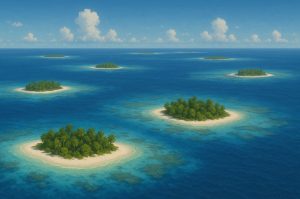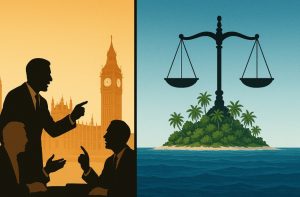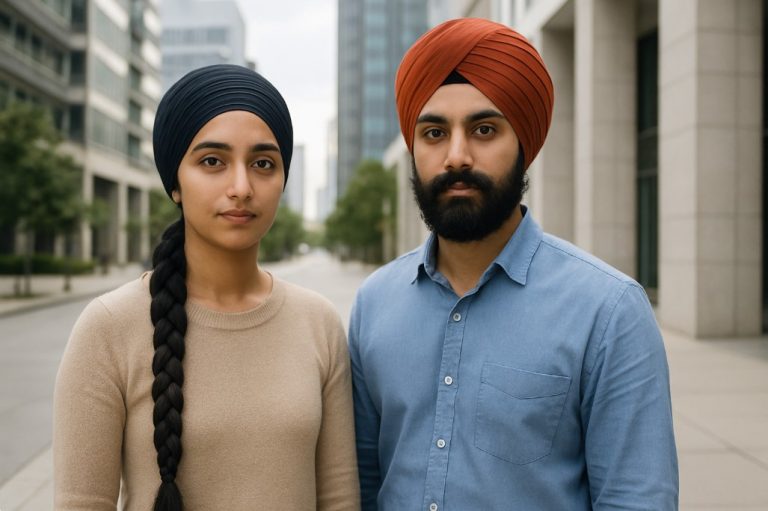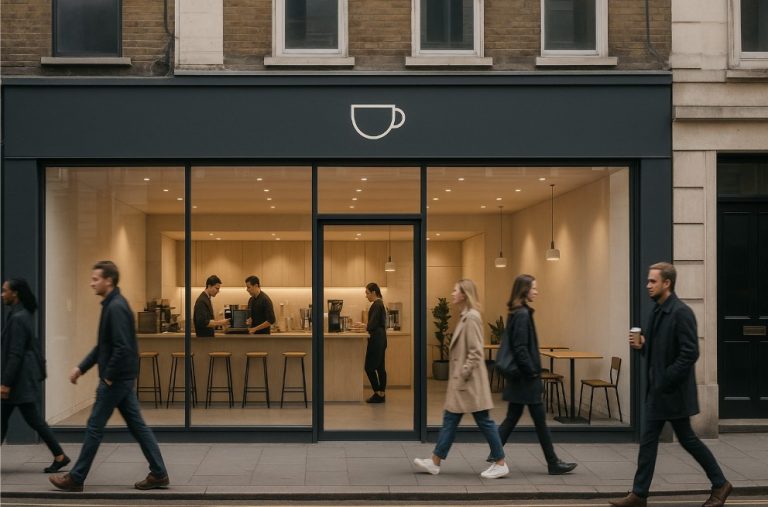In an era defined by escalating global conflicts and shifting power dynamics, the United Kingdom’s decision to relinquish sovereignty over a remote and strategically significant territory in the Indian Ocean may appear puzzling.
The Chagos Archipelago, home to the critical military base on Diego Garcia, has long been a geopolitical asset for both the UK and its ally, the United States.
Yet, in May 2025, the UK signed a formal agreement to transfer sovereignty of the islands to Mauritius.
This historic handover has legal, diplomatic, and security implications, and its roots run deep into colonial history, international law, and modern power politics.
What Is the Chagos Archipelago?

The Chagos Archipelago is a collection of over 60 coral islands in the central Indian Ocean, about 1,200 miles from the coast of Africa and nearly 6,000 miles from the UK.
The islands were administered as part of Mauritius until 1965, when the UK separated them to form the British Indian Ocean Territory (BIOT), shortly before Mauritius gained independence in 1968.
The move was strategic: it enabled the construction of a major UK-US military facility on Diego Garcia, the largest island.
The base has since played a crucial role in operations across the Middle East and Asia, including missions in Iraq and Afghanistan.
However, the separation was controversial from the start and has become the focus of decades of legal and diplomatic disputes.
What Prompted the Recent Sovereignty Transfer to Mauritius?
The decision to return the Chagos Islands to Mauritius was driven primarily by legal pressure, compounded by diplomatic and strategic considerations.
Since the 1980s, Mauritius has claimed that the separation of the Chagos Islands was illegal under international law. Their position has gained overwhelming global support.
In 2019, the International Court of Justice (ICJ) issued an advisory opinion stating that the UK’s detachment of the islands from Mauritius violated the right to self-determination.
The opinion was reinforced by a UN General Assembly resolution and supported by the Special Chamber of the International Tribunal for the Law of the Sea, which confirmed Mauritius’ legal sovereignty.
The UK initially resisted, but a mounting body of international legal rulings created a risk of losing binding cases in the near future.
Defence Secretary John Healey warned Parliament that failure to reach a negotiated deal could result in rulings that would render the Diego Garcia base inoperable, potentially requiring the UK to abandon the site.
Why Is Diego Garcia Strategically Significant?

Diego Garcia is one of the most important military installations in the world. Operated jointly by the UK and the US, the base serves as a launch point for naval and air missions and plays a central role in intelligence gathering and surveillance operations.
Its location allows for rapid deployment across:
- The Middle East
- The Red Sea
- The Horn of Africa
- The Indo-Pacific region
In addition to hosting aircraft and naval assets, Diego Garcia is crucial for its satellite communication capabilities, particularly its access to a protected electromagnetic spectrum regulated by the United Nations in Geneva.
Losing sovereign control over the islands could have meant that:
- Contractors might refuse to visit or supply the base due to legal liabilities.
- Aircraft movement could be restricted by international aviation authorities.
- Satellite communications could be compromised without guaranteed spectrum access.
The UK government concluded that ceding sovereignty under a structured deal was a lesser risk than losing legal control altogether.
What Are the Terms of the UK-Mauritius Agreement?
The agreement signed in May 2025 marks a formal end to British sovereignty over the Chagos Islands but ensures continued military access through a 99-year lease.
The UK will pay Mauritius to lease back Diego Garcia, maintaining operational authority.
Lease and Payment Structure
| Period | Annual Payment | Additional Terms |
| Years 1–3 | £165 million | Initial high payment phase |
| Years 4–13 | £120 million | Base lease continuation |
| Years 14–99 | £120m + inflation | Adjusted annually |
| Chagossian Fund | £40 million | One-time payment for displaced citizens |
| Development Support | £45 million/year | For 25 years for Mauritian infrastructure |
While the government has claimed a net cost of £3.4 billion, economic analysts suggest the long-term cost may be as high as £30 billion, especially when accounting for inflation and interest rates.
How Has the UK Justified the Decision?

In a press conference, Prime Minister Keir Starmer described the handover as a “necessary and unavoidable act of national interest.”
He pointed to the increasing legal vulnerability of the UK’s position and the growing diplomatic isolation Britain faced over the issue.
Starmer noted that the agreement:
- Prevents rival nations, especially China, from establishing a presence on the islands.
- Ensures military continuity for critical Western operations.
- Upholds international law, reinforcing the UK’s diplomatic standing.
He added that without the deal, the UK would have risked “losing control of this vital asset,” potentially allowing foreign powers to operate near or within the archipelago, an outcome deemed “unacceptable” from a national security standpoint.
What Do Critics Say About the Handover?
Not all voices in Westminster or abroad support the move. Critics on the political right, including Tory leader Kemi Badenoch and Reform UK’s Nigel Farage, have denounced the agreement as a “surrender tax” and a “self-inflicted strategic retreat.”
They argue the deal:
- Weakens the UK’s global military presence.
- Ignores the desires of Chagossians, many of whom were not consulted.
- Gives undue influence to international legal bodies over national sovereignty.
Some have gone further, accusing the government of being overly deferential to politically motivated votes at the UN and failing to take a more assertive stance, as might be expected from powers like the US or France in similar situations.
What Role Did International Allies Play?
Although there were early doubts, especially from the United States, the final treaty received strong support from major UK allies.
The US Secretary of State Marco Rubio endorsed the deal, calling it a “historic agreement” that secures the long-term effectiveness of the Diego Garcia base.
Other key allies backing the agreement include:
- NATO
- India
- The Five Eyes intelligence alliance
This international support highlights a consensus that upholding legal norms and securing long-term military cooperation are compatible goals.
What Are the Implications for Chagossians?

Perhaps the most contentious element of the deal is the limited role played by the Chagossians, the original inhabitants forcibly removed by the UK in the 1960s and 70s.
Although the treaty includes a £40 million fund for repatriation and resettlement, critics argue that Chagossians were sidelined during negotiations.
Calls for a comprehensive right of return, guaranteed land rights, and full participation in governance remain largely unresolved.
How Does This Affect the UK’s Diplomatic Image?
Beyond legality and defence, the Chagos agreement is a diplomatic reset. For decades, the UK was accused of undermining its own global messaging by flouting the principles of international law in its refusal to decolonise the Chagos Islands.
By finalising the agreement with Mauritius, the UK now aligns its actions with its rhetoric supporting international law, ethical governance, and multilateral cooperation.
UN Secretary-General Antonio Guterres welcomed the decision, noting that it “demonstrates the value of diplomacy in addressing historical grievances.”
It sends a clear message that post-colonial disputes can be resolved through legal frameworks rather than conflict or coercion.
Timeline of Key Events
| Year | Event |
| 1965 | UK separates Chagos Islands from Mauritius |
| 1968 | Mauritius gains independence |
| 1973 | Forced removal of Chagossians is completed |
| 2019 | ICJ rules UK must relinquish control |
| 2022 | Negotiations between UK and Mauritius begin |
| 2025 | UK signs treaty to return sovereignty to Mauritius |
FAQs About the Chagos Islands Sovereignty Agreement
Why is the UK giving up the Chagos Islands?
Primarily due to international legal rulings and growing diplomatic pressure, coupled with the strategic necessity of preserving military access through a lease agreement.
Will the UK still operate Diego Garcia?
Yes. The UK retains full operational control under a 99-year lease from Mauritius.
How much will this cost UK taxpayers?
Estimates range from £10 billion to £30 billion over the next century, depending on inflation and economic factors.
What safeguards exist against foreign powers entering the region?
The agreement includes a 24-nautical mile buffer zone and UK veto power over any construction or military use.
Were Chagossians involved in the decision?
Not directly. The treaty allocates funds for them, but many have criticised the lack of consultation and guaranteed rights.
Who supports the treaty?
The US, NATO, Five Eyes alliance, India, and the UN support the agreement. Opposition comes largely from domestic political figures and rival global powers.
How does this impact UK foreign policy?
It enhances the UK’s diplomatic credibility by demonstrating adherence to international law, which is crucial in current global conflicts.






